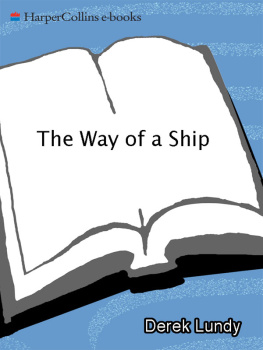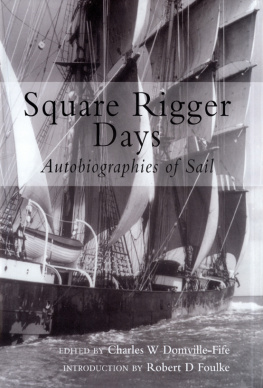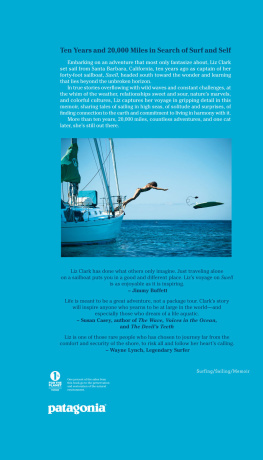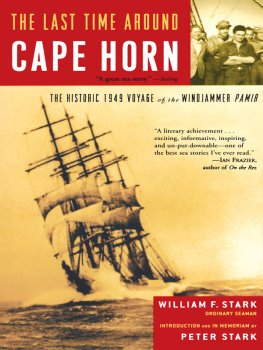CONTENTS
Down to the Seas
Un-homing, Up-anchoring
In Narrow Waters
The Stateliest, Stiffest Frigate
That Unsounded Ocean
The Ocean Paths My Home
The Circle of Her Traverse of the Sea
The Uttermost Cape
The Bloody Horn
Not a Voyage Complete
for The Way of a Ship
A tribute to the seamen of the Age of Sail.
J ONATHAN Y ARDLEY , Washington Post Book World
A fantastic ride through one of the greatest moments in the history of adventureLundy is a master of tension and storytelling.
Seattle Times
The wealth and authority of this book make it a worthy companion to the very best histories on seafaring. This masterly documentary becomes a page-turner to rank with the very best of Patrick OBrian.
P ETER N ICHOLS in the Sunday Times (London)
A saga of life under sail that touches to the quickLundy is particularly good at evoking the most dangerous situations, recounting the interplay between heavy weather and the captains decisions with grim realism, yet lyrically portraying the ship as a living thing that must work, if not in harmony then at least in concert with the riotous elements that surround it.
Kirkus Reviews (starred review)
readers will surface with a strong sense of seagoing history, a knowledge of the specialized skills involved in keeping square-riggers afloat and a respect not only for the fierce power of the elements but also for Lundys considerable talent as a writer.
Publishers Weekly
An exceptionally rich and satisfying weavemaking the reader feel the sting of the wind and the vertiginous plunge of the waveheir to the tradition of Dana, Melville, Conrada descendant of such classics.
J ONATHAN R ABAN , author of Bad Land and Passage to Juneau
Fascinating. I dont think Ive ever read anything that so authoritatively brings to life what it was like to sail a square-rigged vessel.
N ATHANIEL P HILBRICK , author of In the Heart of the Sea
Derek Lundys new, and marvelous, The Way of a Ship attempts an unusual trick. After declaring itself a work of non-fiction, it co-opts the form of the novel, with narrative arc and wholly imagined charactersIt is indeed a work of nonfiction, but in the way that the best novels always are. The settingthe seaultimately becomes the principal character in this gorgeous book and, as a protagonist, Lundys ocean is as real and nuanced and true as Emma Bovary.
Toronto Globe and Mail
A unique and masterful book that offers both intellectual and visceral thrills as it explores the history of the last great windships and the men who sailed them. Lundy gives us an informed and well-researched discussion of late nineteenth-century merchant seafaring; and shows us the mind-numbing heroism and bravery of the common forecastle sailorsthe despised of the Earthperforming feats and enduring hardship and privation that we can scarce imagine, in what is a riveting account of a white-knuckle voyage around Cape Horn.
J AMES L. N ELSON , author of The Pirate Round and Blackbirder
Even those familiar with the lore of the sea will be impressed with the immediacy [Lundy] brings to hisnarrative of one of the hardest passages of the days of sail. You canfeel the numbing fatigue of half-frozen men beating themselves half to death fisting tattered canvas in the middle of the night, 40, or 80, or 100 feet above a deck that disappears under huge ocean swells.
San Diego Union-Tribune
Unique. a chronicle of seafaring life in the late nineteenth century. I became engrossed [by] Lundys attention to detail and his ability to balance the romance of deepwater-sailwith often nail-biting action.
The Times-Colonist (Victoria, BC)
First published in Canada in 2002 by Knopf Canada.
Permissions may be found on
The drawings on are by C.S. Richardson.
The photograph on is courtesy of the author.
THE WAY OF A SHIP . Copyright 2002 by Beara Inc. All rights reserved under International and Pan-American Copyright Conventions. By payment of the required fees, you have been granted the non-exclusive, non-transferable right to access and read the text of this ebook on-screen. No part of this text may be reproduced, transmitted, down-loaded, decompiled, reverse engineered, or stored in or introduced into any information storage and retrieval system, in any form or by any means, whether electronic or mechanical, now known or hereinafter invented, without the express written permission of HarperCollins ebooks.
First Ecco paperback edition published 2004
The Library of Congress has catalogued the hardcover editions as follows: Lundy, Derek, 1946
The way of a ship : a square-rigger voyage in the last days of sail / Derek Lundy.1st ed.
p. cm.
ISBN 0-06-621012-7
1. Seafaring life. 2. Lundy, BenjaminJourneys.
3. Square-riggers. I. Title.
G540 .L96 2003
910.45dc21 2002035246
ISBN 0-06-093537-5 (pbk.)
EPub Edition FEBRUARY 2013 ISBN: 9780062283436
04 05 06 07 08 OS/RRD 10 9 8 7 6 5 4 3 2 1
TO MY MOTHER
AND TO
ROBERT AND DIANE HELE




Them was the days, sonnies,
Them was the men,
Them was the ships
As well never see again .
C. FOX SMITH , What the Old Man Said

To snatch in a moment of courage, from the remorseless rush of time,
a passing phase of life
JOSEPH CONRAD , preface to The Nigger of the Narcissus
There never was a sailors tale that wasnt a damn lie.
KENNETH ROBERTS , Captain Caution
B altazar is anchored in a small bay on the east side of Isla Herschel, on the Paso al Mar del Sur, almost exactly seven miles north-northeast of Cape Horn. Were recording a sustained wind of more than sixty knots at deck level and gusts of close to eightyalthough theyre as much as 30 per cent stronger at the masthead. The anchor is dug into the sand bottom, good holding, with two hundred feet of chain out and two nylon snubbing lines to absorb the shock of the waves.
Before the front crossed over, the wind was out of the northeast. We were almost wide open in that direction, out into the Bahia Arquistade and beyond it, to the great Southern Ocean itself. For twelve hours, we pitched into seas eight to ten feet high before the wind backed first to the northwest and then west, rising to near-hurricane strength as it clocked round. By then, the low, grassy hills astern and on our sides gave us the protection we had counted on.
Apart from the anchor, we have three lines out to shore, two secured to wind-carved dwarf trees one hundred feet off our stern and one running off our port side, shackled to a cable we have wrapped around a large rock. The lines are fouled with hundreds of pounds of cleaving kelp, broken away from its beds by the storm. The weight adds strain to the lines but also dampens down their surges as the wind slams into the hull and rigging of our fifty-foot steel boat.















